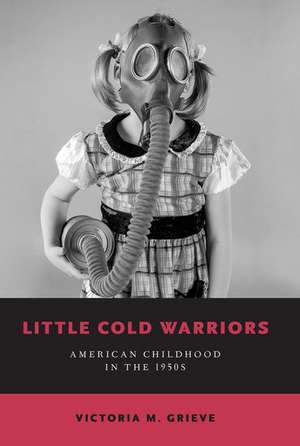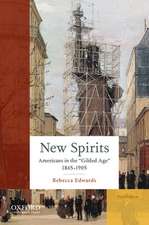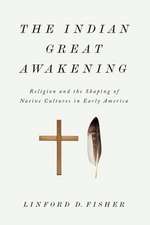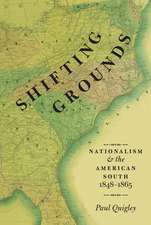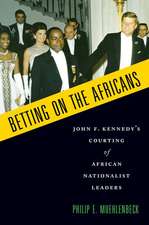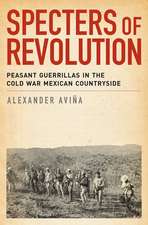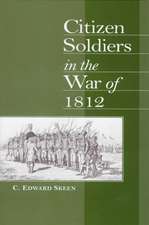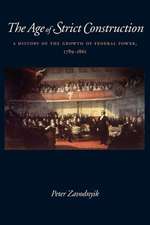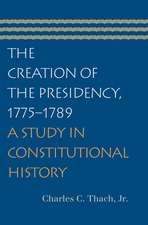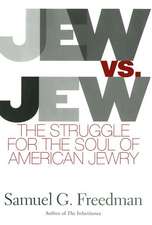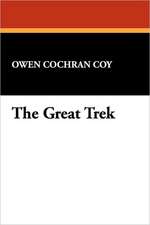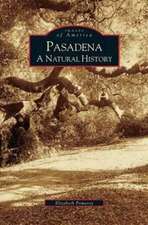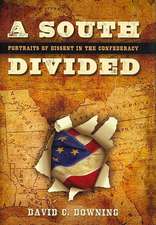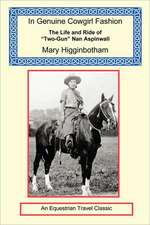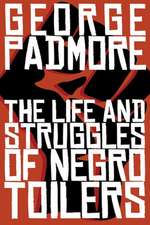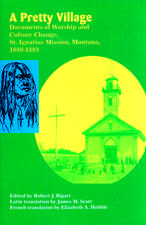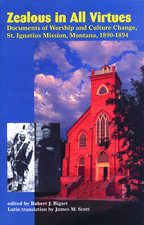Little Cold Warriors: American Childhood in the 1950s
Autor Victoria M. Grieveen Limba Engleză Paperback – 17 iul 2020
| Toate formatele și edițiile | Preț | Express |
|---|---|---|
| Paperback (1) | 181.84 lei 11-16 zile | |
| Oxford University Press – 17 iul 2020 | 181.84 lei 11-16 zile | |
| Hardback (1) | 491.24 lei 32-37 zile | |
| Oxford University Press – 19 iul 2018 | 491.24 lei 32-37 zile |
Preț: 181.84 lei
Preț vechi: 219.67 lei
-17% Nou
Puncte Express: 273
Preț estimativ în valută:
34.81€ • 36.18$ • 28.86£
34.81€ • 36.18$ • 28.86£
Carte disponibilă
Livrare economică 06-11 ianuarie 25
Preluare comenzi: 021 569.72.76
Specificații
ISBN-13: 9780197532904
ISBN-10: 019753290X
Pagini: 218
Dimensiuni: 231 x 152 x 15 mm
Greutate: 0.34 kg
Editura: Oxford University Press
Colecția OUP USA
Locul publicării:New York, United States
ISBN-10: 019753290X
Pagini: 218
Dimensiuni: 231 x 152 x 15 mm
Greutate: 0.34 kg
Editura: Oxford University Press
Colecția OUP USA
Locul publicării:New York, United States
Recenzii
Grieve provides a wealth of examples and details the agencies and individuals involved. The arguments are convincing, and the evidence is substantial. Grieve's writing is well-organized and easy to follow, and her analysis is discerning ... Highly recommended.
Grieve...reminds readers of the importance of soft power in a modem age that has increasingly disregarded it. We see in this book how the imagery and products of childhood promoted an American Cold War agenda in countless tiny ways.... This book is...well written and will be of interest to scholars seeking to learn about the intersection of American children's culture and the Cold War.... Grieve has clearly mastered the art of storytelling, and particular chapters could be of real use in the undergraduate classroom.
Not only does Grieve add to the scholarship around the growth of the postwar state, but she also offers strong evidence about the pernicious nature of the state apparatus.
Grieve's work demonstrates an effort to uncover children as historical actors on the world stage and also urges caution about presuming to understand children's motivations or the meanings they drew from various texts. Her book brings important new insights to both diplomatic history and the history of children and youth.
This is a slender volume that makes a significant, thought-provoking contribution to the fields of propaganda, public diplomacy, culture, childhood, and Cold War history. Grieve's depictions of the agency and activism among children and young adults during the Cold War are sure to provoke additional penetrating histories, along with many fascinating classroom discussions.
Victoria M. Grieve's well-researched...Little Cold Warriors is a masterly exploration of U.S. propaganda and cultural diplomacy. It is also a testament to how support for Cold War imperatives benefitted not only the U.S. government but also businesses, not-for-profits, and cultural producersâ.It is a book about the ways that adults from numerous arenas deployed ideas about childhood, both domestically and globally, to serve political (and, indeed, commercial) ends.
In Little Cold Warriors: American Childhood in the 1950s, Victoria Grieve dismantles a series of misconceptions about the role of children and the image of childhood during the early Cold War era... The fields of diplomatic and political history cannot underestimate the experience of childhood and the ways people first come to understand themselves both in relation to the nation and in relation to politics. It is common for children to be written off as non-historical actors or lacking historical agency, but as Grieve contends, to do so is to risk fundamentally misunderstanding their significance in the growth of the state, in American diplomacy tactics, and in the origins of our politics.
A set of findings that should, indeed, be incorporated into our understanding of childhood in the 1950s and of Baby-Boomer adulthood.
Victoria Grieve is among a growing number of scholars who recognize that youthful political activism did not disappear between 1945 and 1960. Little Cold Warriors provides new insights into the continued politicization of childhood during the Cold War and is a must read for those interested in understanding twentieth-century childhoods and the broader contours of Cold War cultural politics.
This important text moves American children of the 1950s out from under their school desks and places them where they belong: at the fore of the United States' ideological war against communism. From the very first page, Grieve challenges readers to look beyond a nostalgic, idealized vision of Baby Boomer childhood and instead and to recognize the ubiquitous politicization of children's culture. Drawing on sources from international children's art exchanges to the Lone Ranger, Grieve shows that American youth were taught the twin precepts of international friendship, and the patriotic necessity of American economic and political dominance.
Taking us beyond the iconic 'duck and cover' drills of the era, Grieve explores a range of youth- focused government and private initiatives that enrich our understanding of Cold War politics and the development of Post-World War II youth activism. Placing children and youth at the center of her story, she reveals the important roles they played as both powerful symbols and as important actors in American diplomacy and defense.
Grieve...reminds readers of the importance of soft power in a modem age that has increasingly disregarded it. We see in this book how the imagery and products of childhood promoted an American Cold War agenda in countless tiny ways.... This book is...well written and will be of interest to scholars seeking to learn about the intersection of American children's culture and the Cold War.... Grieve has clearly mastered the art of storytelling, and particular chapters could be of real use in the undergraduate classroom.
Not only does Grieve add to the scholarship around the growth of the postwar state, but she also offers strong evidence about the pernicious nature of the state apparatus.
Grieve's work demonstrates an effort to uncover children as historical actors on the world stage and also urges caution about presuming to understand children's motivations or the meanings they drew from various texts. Her book brings important new insights to both diplomatic history and the history of children and youth.
This is a slender volume that makes a significant, thought-provoking contribution to the fields of propaganda, public diplomacy, culture, childhood, and Cold War history. Grieve's depictions of the agency and activism among children and young adults during the Cold War are sure to provoke additional penetrating histories, along with many fascinating classroom discussions.
Victoria M. Grieve's well-researched...Little Cold Warriors is a masterly exploration of U.S. propaganda and cultural diplomacy. It is also a testament to how support for Cold War imperatives benefitted not only the U.S. government but also businesses, not-for-profits, and cultural producersâ.It is a book about the ways that adults from numerous arenas deployed ideas about childhood, both domestically and globally, to serve political (and, indeed, commercial) ends.
In Little Cold Warriors: American Childhood in the 1950s, Victoria Grieve dismantles a series of misconceptions about the role of children and the image of childhood during the early Cold War era... The fields of diplomatic and political history cannot underestimate the experience of childhood and the ways people first come to understand themselves both in relation to the nation and in relation to politics. It is common for children to be written off as non-historical actors or lacking historical agency, but as Grieve contends, to do so is to risk fundamentally misunderstanding their significance in the growth of the state, in American diplomacy tactics, and in the origins of our politics.
A set of findings that should, indeed, be incorporated into our understanding of childhood in the 1950s and of Baby-Boomer adulthood.
Victoria Grieve is among a growing number of scholars who recognize that youthful political activism did not disappear between 1945 and 1960. Little Cold Warriors provides new insights into the continued politicization of childhood during the Cold War and is a must read for those interested in understanding twentieth-century childhoods and the broader contours of Cold War cultural politics.
This important text moves American children of the 1950s out from under their school desks and places them where they belong: at the fore of the United States' ideological war against communism. From the very first page, Grieve challenges readers to look beyond a nostalgic, idealized vision of Baby Boomer childhood and instead and to recognize the ubiquitous politicization of children's culture. Drawing on sources from international children's art exchanges to the Lone Ranger, Grieve shows that American youth were taught the twin precepts of international friendship, and the patriotic necessity of American economic and political dominance.
Taking us beyond the iconic 'duck and cover' drills of the era, Grieve explores a range of youth- focused government and private initiatives that enrich our understanding of Cold War politics and the development of Post-World War II youth activism. Placing children and youth at the center of her story, she reveals the important roles they played as both powerful symbols and as important actors in American diplomacy and defense.
Notă biografică
Victoria Grieve is Associate Professor at Utah State University and the author of The Federal Art Project and The Creation of Middlebrow Culture (University of Illinois Press, 2009). Her research spans childhood studies, visual culture, and cultural politics from the New Deal to the Cold War.
